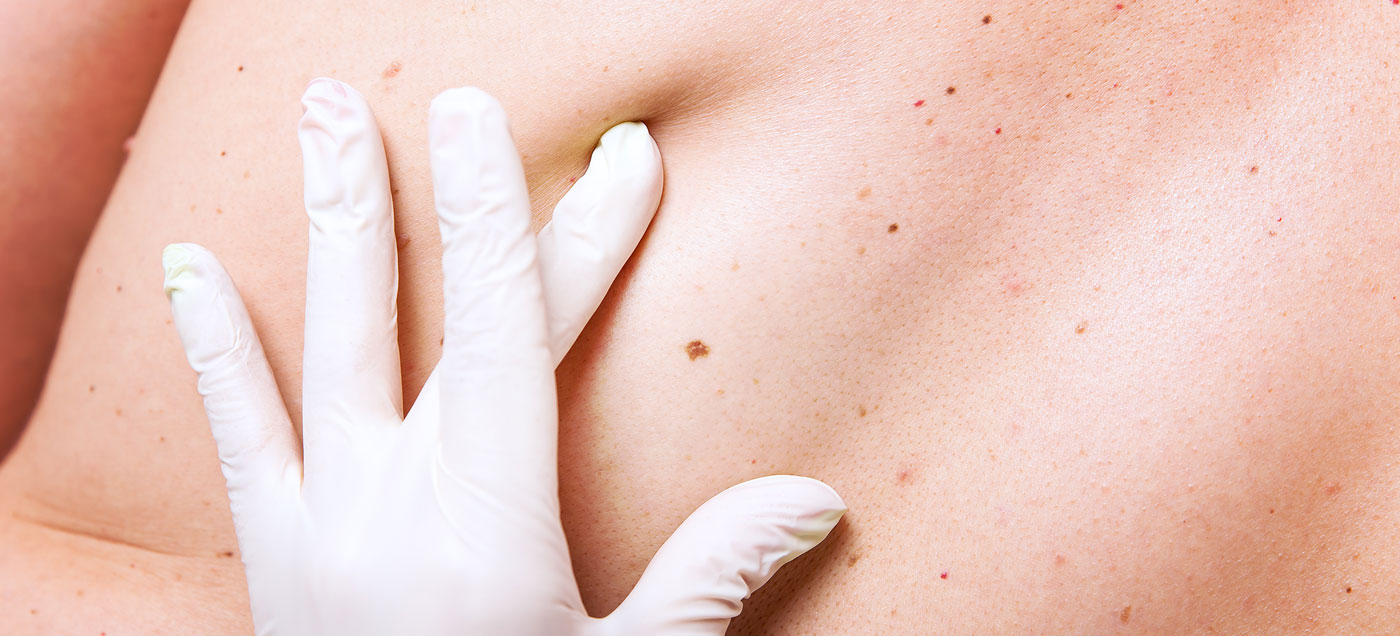
Understanding skin cancer
Early Detection
Your best defense against skin cancer is to find it early. Finding cancer early provides you with more treatment options and chance at positive outcomes.
Seeing your doctor regularly and learning to recognize the signs and risks of skin cancer is essential to catching the disease before it spreads to other areas.
At Baptist MD Anderson, we follow MD Anderson’s model of outstanding patient care, research, prevention and education. Our commitment is to bring world-renowned cancer care close to home.
Know what to look for
Signs of Skin Cancer
The only way to know for sure whether a mole or spot on your skin is cancer is to have a doctor look at it. If you have any of these signs, it’s best to make an appointment with a dermatologist.
Risk factors
Skin cancer risk factors include:
- Age
- Blonde or red hair, light eye color, and fair skin that freckles or sunburns easily
- Sun exposure
- Tanning bed exposure
- Previous skin cancer
- Previous skin injuries, such as a major scar
- Family history of melanoma
- Excessive moles – 50 or more
- Compromised immune system
Prevention
While skin cancer can happen to anyone, there are steps you can take to reduce your risk of this disease:
- Avoid sunburns
- Use broad spectrum SPF
- Avoid tanning, especially UV tanning beds
- Seek the shade
- Wear sun-resistant clothing
- Examine your skin each month to look for changes to moles and other skin spots

Catching skin cancer early
Screening
Screening improves your chances of detecting cancer at an early stage, when it is easier to treat, and may help limit the spread to other areas of your body. While sun and tanning bed exposure increase your risk, skin cancer can happen to anyone.
Early-stage skin cancer is curable and when treated early, you have a better chance of a successful cure and maintaining a good quality of life.
When should you have skin cancer screening?
You can do monthly self-exams using the ‘ABCDE’ rule to help you identify changes to moles and other skin spots that you should get checked out by your primary care doctor or dermatologist:
- A = asymmetry (one half of the mole does not match the other half)
- B = border irregularity (edges of the mole are ragged or blurred)
- C = color (pigmentation of the mole is not uniform, with varying degrees of brown or black)
- D = diameter of more than ¼ inch (about the size of a pencil eraser)
- E = evolving (the mole is changing over time)
In addition, we recommend regular skin cancer screening exams by a doctor for high-risk individuals who identify with one of more of the following criteria:
- Family history of skin cancer
- Previous personal skin cancer history
- Frequent sun exposure
- Frequent tanning bed exposure
- Pre-cancerous cell detection on the skin
Regardless of your personal risk factors, you should become familiar with your skin so you can notify your primary care doctor or dermatologist immediately if you notice any changes.
Contact Us
If you have any questions, we have you covered. We have nurse navigators available to guide you through every step of your care. Request an appointment or speak to a nurse navigator by phone or online.

Our Location
Skin Cancer Clinic
Within our specialized, multidisciplinary clinics, we bring together our team of experts to care for your mind, body and spirit - all under one roof. Each of our clinics are singularly focused on your specific needs and treatment.
Need Directions? The skin cancer clinic is located at the Baptist MD Anderson Cancer Center.
Find a Doctor
Our care team brings medical oncologists, radiation oncologists, surgeons and other specialists together for each patient.
For whatever step is next,
Baptist MD Anderson is Here for You
Wherever you are in your journey, we’re here to help you in your fight against cancer. Our team of experts can help you navigate the whirlwind of emotions and decisions through every aspect of your care.
Get a second opinion
The right treatment starts with the right diagnosis.
Find a support service
Care for your mental, spiritual health, too.
Prepare for your appointment
See everything you need to know before coming in.

I have always been very diligent about using sunblock, but that screening was my ‘Aha!’ moment.
— SARA MCKEE, skin cancer survivor
After taking part in running a skin screening tent at a local event, Sara knew it was time to get her own skin looked at, too. And she’s very glad she did.


